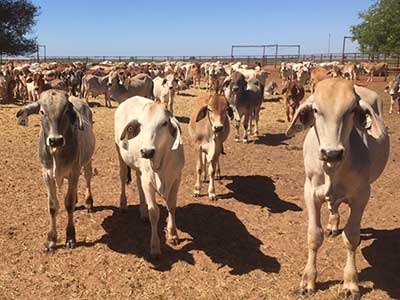Production and welfare benefits from managing potential pain during castration and dehorning in the Northern Territory

Caption: Weaners in the yards.
The Northern Territory (NT) Department of Industry, Tourism and Trade (DITT) has recently started a joint project with Western Australia, Queensland and Meat and Livestock Australia (MLA) to investigate the application of pain relief products during castration and dehorning in northern Australia. Production and welfare benefits from managing potential pain after routine husbandry procedures will be investigated.
Why?
The industry is constantly improving animal husbandry practices. With the recent introduction and approval of several pain relief products for use on calves, there have been calls for a large-scale trial to compare long-term production benefits to be conducted on ‘real world’ properties.
Outcomes
Anticipated outcomes from the trial include:
- an assessment of any production benefit from providing pain relief to calves during castrating and dehorning, through monitoring liveweight, infection and any instances of mortality
- an assessment of the impacts of providing pain relief on animal behaviour following the procedures
- a survey of participating producers on their experiences using the pain relief.
What’s involved for participating properties?
Participating properties will need approximately 600 calves that are to be castrated and / or dehorned (this may be at the same time as weaning depending on your operation). This will be worked in with your regular mustering time. Prior to castration / dehorning, calves must be able to be weighed and tagged with either a National Livestock Identification System tag or management tag with a unique number, so each individual animal’s weight change can be monitored.
DITT will provide the pain relief products and a member of the DITT Livestock team will be there on the day to record animal information. Calves will then need to be reweighed three weeks later. A comparison will be made of the different groups following the procedures to see if the animals that received the pain relief products have a better liveweight response than those that did not.
Behaviour will be monitored through accelerometer tags and Global Positioning System collars on a select number of animals.These will be applied during castration / dehorning and removed when they return for weighing three weeks later.
Want to be part of the trial?
If you would like to be part of the trial, or would like some more information, please contact:
Melissa Wooderson
Katherine Research Station
Phone: 08 8973 8476
melissa.wooderson@nt.gov.au
